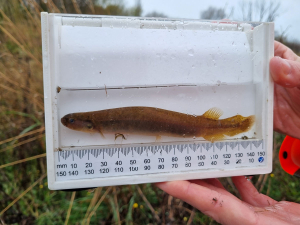Simon Upton urges cross-party consensus on New Zealand environmental goals
Parliamentary Commissioner for the Environment Simon Upton is calling for cross-party consensus on the country's overarching environmental goals.
 The Kōwaro or Canterbury Mudfish has been confirmed at the Somerset dairy farm south of Timaru. Photo Credit: Department of Conservation.
The Kōwaro or Canterbury Mudfish has been confirmed at the Somerset dairy farm south of Timaru. Photo Credit: Department of Conservation.
A critically threatened endemic freshwater fish found only in Canterbury has been discovered at a Craigmore Sustainables farm near Timaru.
The Kōwaro or Canterbury Mudfish has been confirmed at the Somerset dairy farm south of Timaru following visits by Department of Conservation (DOC) staff in April and May.
The population of mudfish was found living in the farm’s irrigation spring, an ideal habitat for mudfish because of the clean, clear water and the dense aquatic plant growth. The DOC team netted 72 mudfish ranging in size from 77 mm to 149 mm in length.
Somerset business manager, Alex Pattullo, says the discovery follows the completion of a comprehensive waterway restoration project over the last two years.
“We have replaced the old diesel irrigation pump with a new electric pump to reduce risk of any chemical leeching or contamination and fenced the site to stock-proof it.
“In addition, more than 2,760 native plants consisting of dry woodland shrubs and trees as well as flax and reed plants have been planted at the water edge. This will ensure a regenerating native bush block around the site, providing shade, shelter and food for many native and endangered species.”
A report by DOC states riparian planting is “extensive” and “had a variety of species”.
The report concluded that the composition of macrophytes (acquatic plants) in the water was diverse and representative of good water quality and stable hydrology, both good indications of habitat quality.
The water itself had excellent clarity, probably because it was spring-fed and largely free of stock.
Stuart Taylor, Craigmore’s general manager of farming, says the company regards it as a privilege and a serious responsibility to be entrusted to manage land, soils, water and other natural resources in New Zealand
“Craigmore has several sustainability programmes in place to ensure we strike a balance between respecting the environment and running a sustainable and profitable rural operation.
“We strive to grow healthy and safe products while at the same time protect and enhance soil and water quality.
“We’re committed to leaving the world in a better place and allow the generations that follow to continue to earn a living from the land.”
The 5+ A Day Charitable Trust has launched a collection of affordable recipes designed to turn everyday vegetables into seasonal stars.
Jane Mellsopp has been confirmed as the new Government Appointee to the New Zealand Meat Board (NZMB).
To celebrate the tenth anniversary of its annual Good Deeds competition, Rabobank will give away $100,000 to improve rural community hubs, schools, clubrooms, and marae across New Zealand.
Agricultural and veterinary product supplier Shoof International has appointed Michaela Dumper as its new chief executive.
Federated Farmers is celebrating following the Government's announcement that young farmers will be able to use their KiwiSaver funds to buy their first home or farm.
The Meat Industry Association of New Zealand (MIA) today announced that Chief Executive Officer Sirma Karapeeva has resigned from the role.